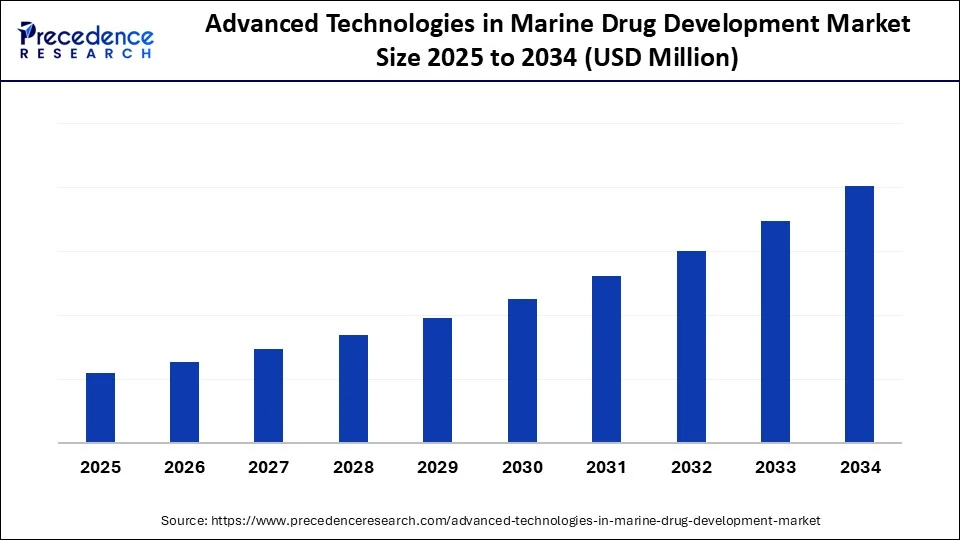The world’s oceans are an untapped reservoir of unique bioactive compounds, offering immense promise for the development of novel drugs. Marine organisms, ranging from deep-sea bacteria to sponges, algae, and mollusks, produce a wide array of complex chemical structures, many of which are not found in terrestrial species. With the rise of drug resistance, especially in cancer and infectious diseases, researchers and pharmaceutical companies are turning to marine biodiversity to discover and develop next-generation therapies. The advanced technologies in marine drug development market is witnessing substantial growth as innovations in genomics, synthetic biology, artificial intelligence (AI), and high-throughput screening enable the efficient discovery and commercialization of marine-based pharmaceuticals.

One of the key reasons for the rising popularity of marine-derived drugs is their biochemical novelty. Marine species have evolved under extreme environmental pressures—such as darkness, high pressure, salinity, and limited nutrients—which has led them to develop unique metabolic pathways and defensive compounds. These bioactives exhibit high specificity and potency, making them ideal candidates for drug development. For instance, marine peptides and alkaloids have shown promising results in oncology, while marine-derived enzymes and polysaccharides are being explored for antiviral, anti-inflammatory, and neuroprotective applications.
The growth of this market is driven by several factors. First, there is an urgent global need for new antimicrobial agents to combat the increasing threat of antibiotic resistance. Marine microorganisms have shown immense potential in this area, producing compounds with novel modes of action. Second, technological advancements such as CRISPR gene editing, AI-driven compound screening, and marine metagenomics have transformed the way marine resources are studied. These tools allow researchers to rapidly identify, isolate, and optimize marine bioactives, drastically reducing the time and cost of drug development. Additionally, rising investments from both public and private sectors are fueling research and commercialization efforts. Countries across North America, Europe, and Asia-Pacific are funding large-scale marine biotechnology initiatives aimed at sustainable drug discovery.
Market Scope
| Report Coverage | Details |
| Dominating Region | North America |
| Fastest Growing Region | Asia Pacific |
| Base Year | 2024 |
| Forecast Period | 2025 to 2034 |
| Segments Covered | Technology Type, Source Organism, Therapeutic Application, Development Stage, End Use, and Region |
| Regions Covered | North America, Europe, Asia-Pacific, Latin America, and Middle East & Africa |
According to recent projections, the advanced technologies in marine drug development market is expected to grow from USD 2.1 billion in 2024 to USD 9.51 billion by 2034, expanding at a compound annual growth rate (CAGR) of 16.21%. This robust growth highlights the rising importance of marine-derived compounds in modern medicine. Leading pharmaceutical companies are expanding their pipelines with marine-based products, particularly in oncology and infectious diseases, where there is a strong unmet need for more effective and safer treatments.
Read Also: Tech-Enabled Pharmaceutical Facilities Market – The Future of Drug Manufacturing
In terms of segmentation, antitumor drugs are expected to dominate the market due to their increasing application in cancer therapeutics. Compounds like trabectedin, derived from sea squirts, have already been approved for clinical use, setting a precedent for further innovation. Antibiotics from marine bacteria, such as salinosporamide, and anti-inflammatory agents from algae and sea cucumbers are also gaining traction. On the technological front, genomics and metabolomics are playing a vital role in unlocking marine organisms’ biosynthetic pathways. AI and machine learning are enhancing lead compound identification and optimization, while high-throughput screening is enabling the rapid evaluation of thousands of marine extracts.
Regionally, North America holds the largest share of the global market, owing to its advanced biotechnology infrastructure, strong intellectual property frameworks, and high R&D spending. The United States is home to several companies and research institutes that specialize in marine drug discovery. Europe follows closely, with countries like Germany, France, and Norway leading marine biotechnology research under the Blue Bioeconomy initiative. Asia-Pacific, particularly countries such as Japan, China, and South Korea, is expected to witness the fastest growth, driven by rich marine biodiversity, growing pharmaceutical demand, and increasing government support for marine innovation.
Key players in this market include PharmaMar S.A., Marinomed Biotech AG, Nofima AS, Sirenas, and Seaweed & Co., among others. These companies are focusing on developing proprietary marine compound libraries, investing in AI-driven platforms, and partnering with research institutions to accelerate drug discovery. PharmaMar, for instance, has already commercialized several marine-derived anticancer drugs, while startups like Sirenas are using advanced algorithms to model marine compound interactions with human disease targets.
Despite the vast opportunities, the market faces several challenges. Sustainable harvesting of marine organisms is critical to avoid ecological damage, making aquaculture and synthetic biology essential components of future supply chains. Moreover, the cost of deep-sea exploration and compound purification can be prohibitive. Regulatory hurdles and long clinical timelines also pose barriers to commercialization. However, with continuous advancements in marine culturing, genome mining, and bioinformatics, these challenges are being gradually addressed.
Looking ahead, the integration of marine biotechnology with personalized medicine, nanotechnology, and green chemistry will likely open new frontiers in healthcare. Researchers are already exploring how marine microorganisms can be engineered to produce therapeutic proteins, vaccines, and immune modulators. AI-driven drug design is expected to reduce the failure rates of marine-derived drugs in clinical trials, making the pipeline more robust and cost-effective. Furthermore, innovations like organ-on-chip and lab-on-chip devices may enable real-time testing of marine compounds for specific patient profiles, accelerating the adoption of precision medicine.
The advanced technologies in marine drug development market is on the cusp of a transformative decade. With increasing investments, regulatory support, and scientific breakthroughs, marine-derived pharmaceuticals may soon become a cornerstone of global healthcare. As researchers dive deeper into the blue frontier, the ocean’s secrets could unlock lifesaving treatments that benefit millions worldwide.